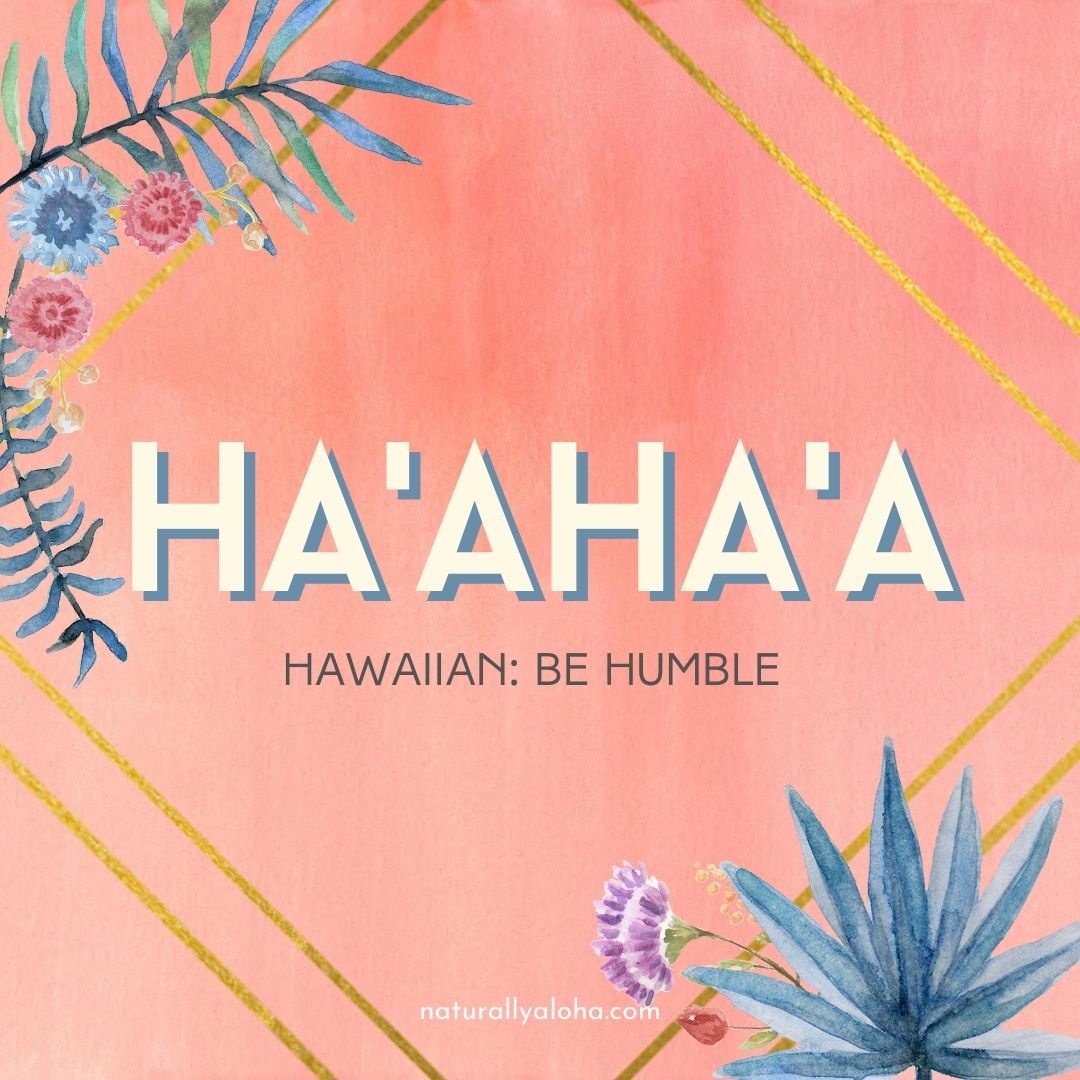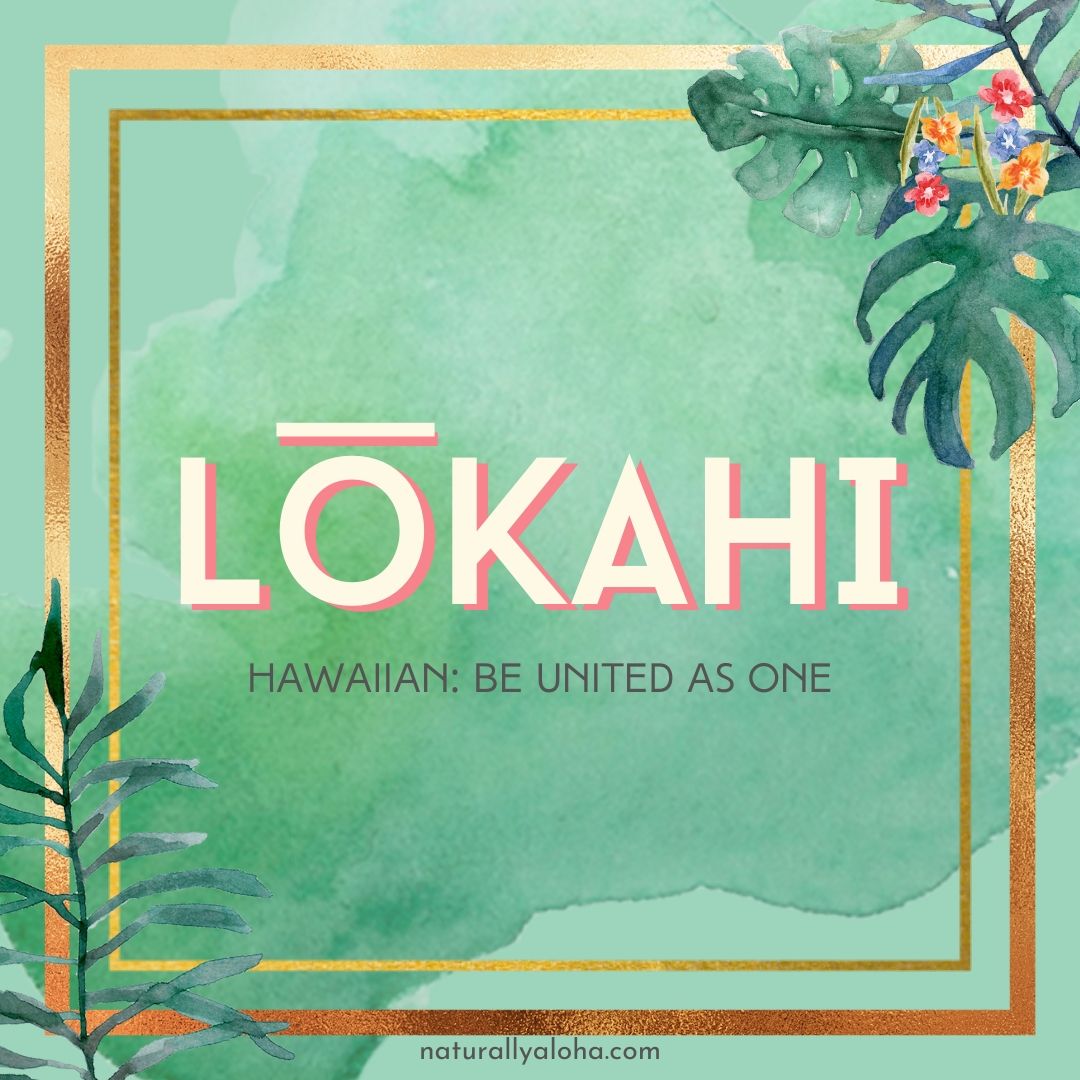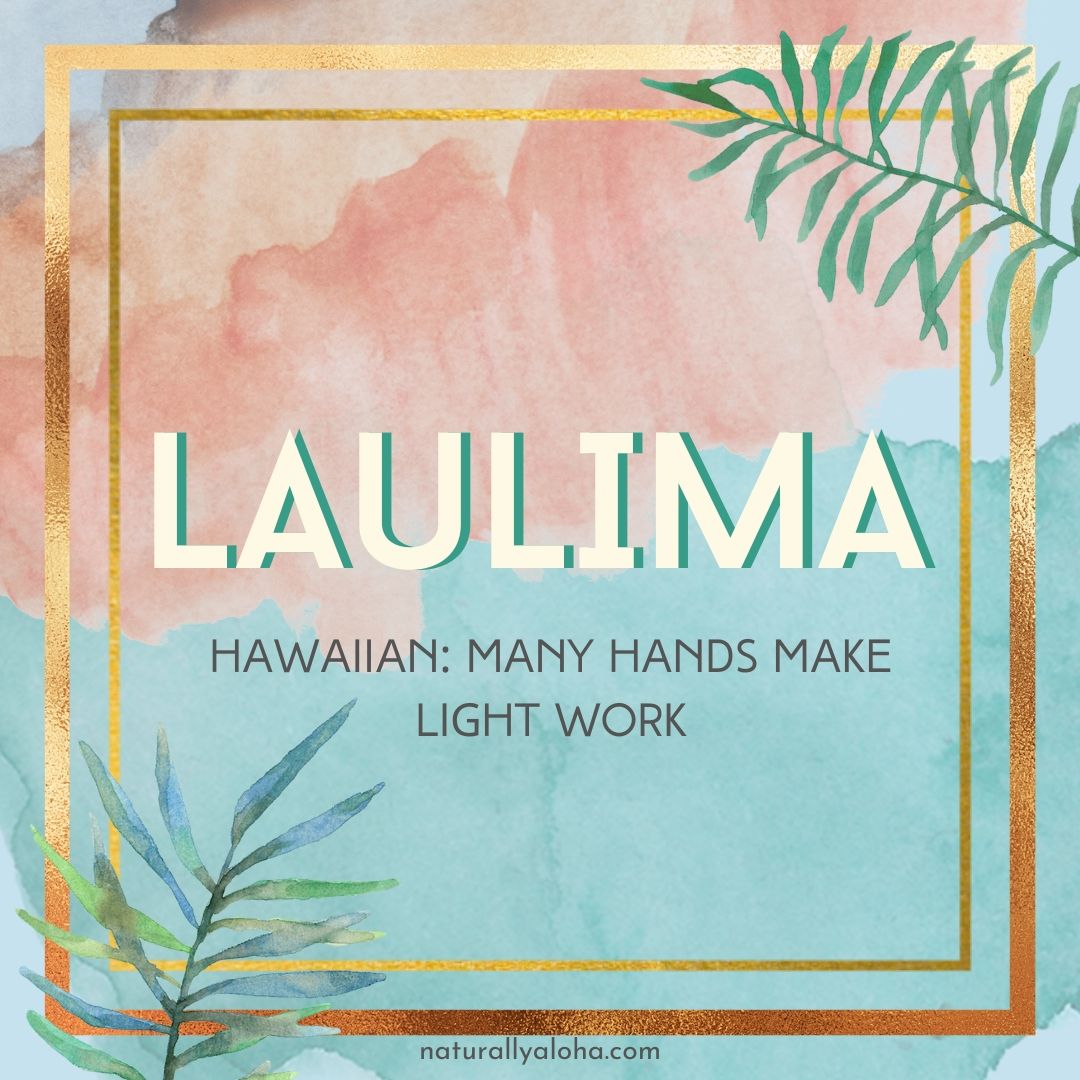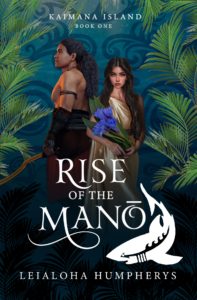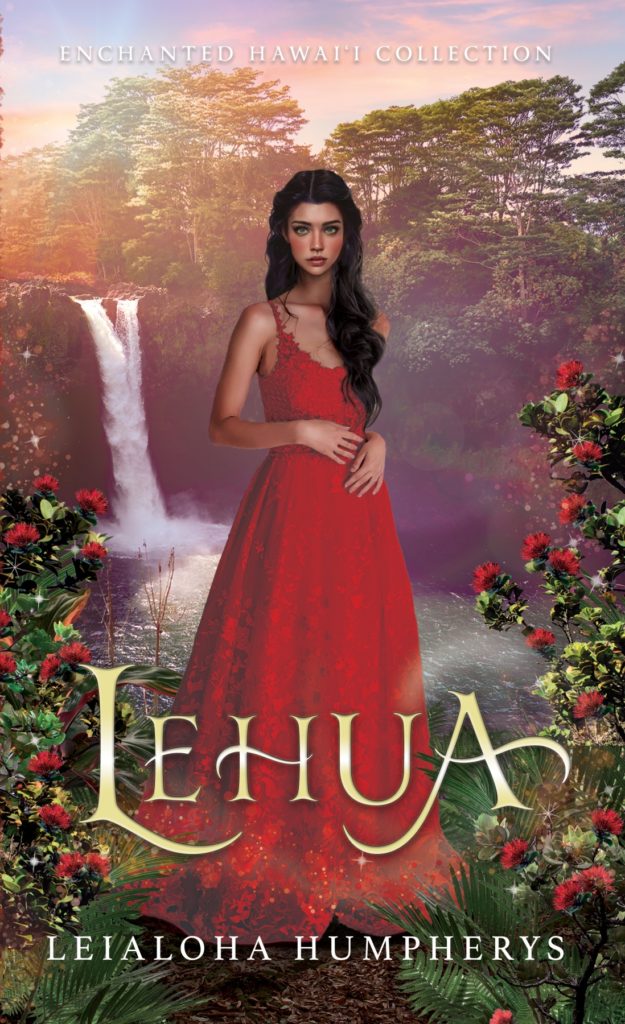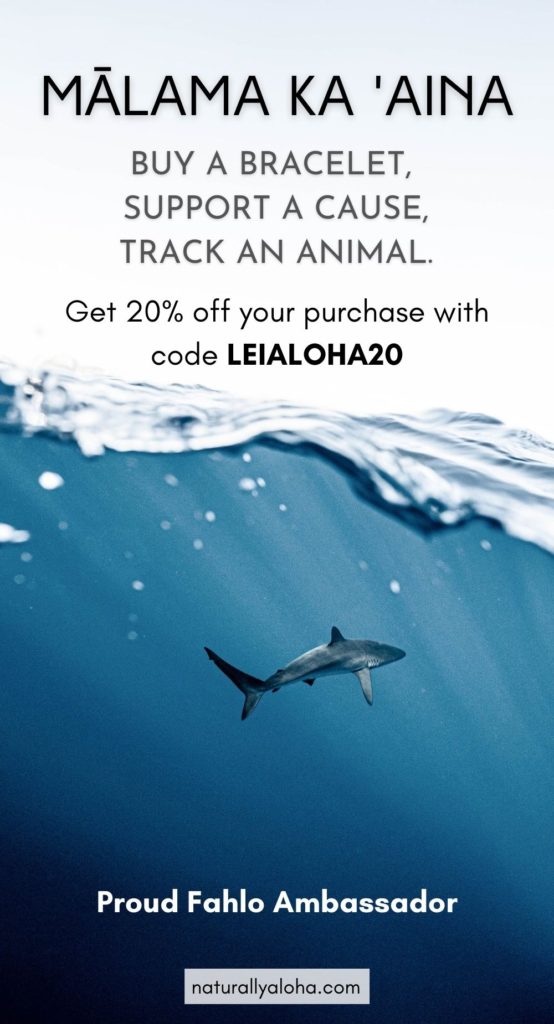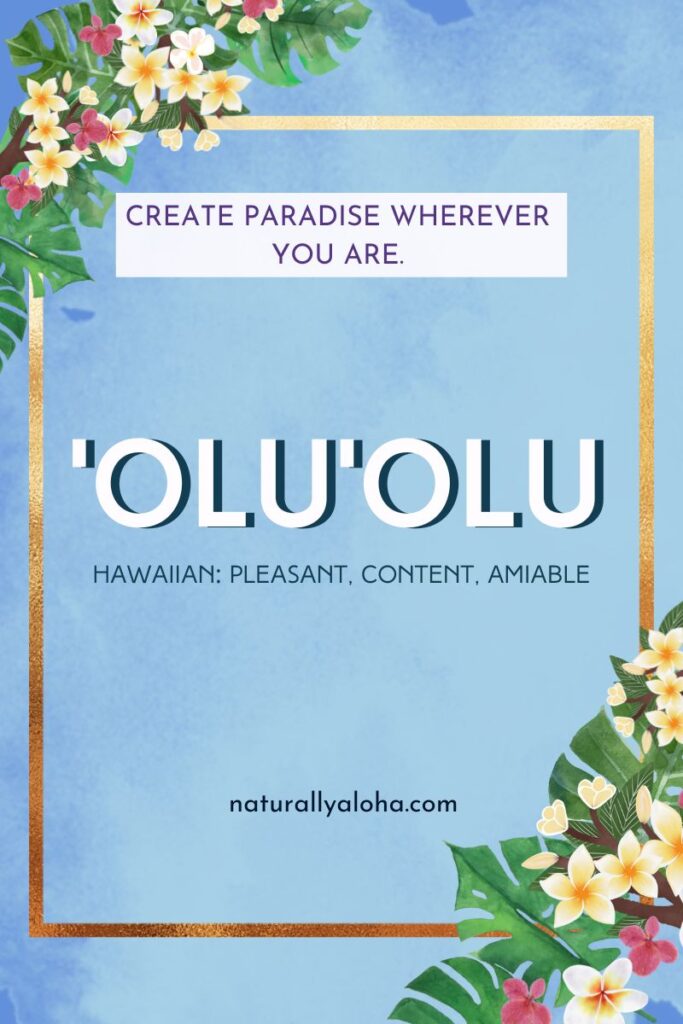
Do you want to know how to stay calm in any situation? Have you ever had a bad day, where you feel down, but then you see someone you truly admire, and it turns that bad day right around? What is it about some people that changes the mood, the tone, and emotions of a circumstance? And how do some people have a “superpower” to help you regain focus on the things that matter most?
In Hawaii, there’s a word and a value that can help us be better as people, friends, and family members. It is one way we can show aloha to others.
‘Olu’olu.
‘Olu’olu Weather
What I love about the Hawaiian language is that one word is used for multiple purposes. The term ‘olu’olu is used to describe weather that is pleasant, refreshing, and mild. ‘Olu’olu is also used to describe someone who is friendly, happy, and gracious.
If you can imagine an ‘olu’olu kind of a day, what does that look like? We can learn so much from observing nature. I imagine a beautiful day as warm weather—not too hot, but not cold—with a gentle breeze. Hawaii has ‘olu’olu weather quite often.
Those who live in a spirit of ‘olu’olu are like nice weather: they’re not overbearing or too much. They know how to put out even the most heated arguments with tact and poise. They bring a refreshingly optimistic and hopeful attitude to any situation. Friendliness is a key trait. And they can make even the shyest person feel loved and welcome.
Can we each be a little more ‘olu’olu? In this article we’ll discuss how to be a more friendly and pleasant person. Because when we choose friendliness and kindness, we share aloha with the world.
The Woman Who Loved Everyone
I want to share about a recent experience that illustrates ‘olu’olu for me. She was the kind of person who taught me how to stay calm in any situation. My husband, baby, and I were on a 2-week trip in Nauvoo, Illinois for my husband’s work. During the winter months, Nauvoo is a ghost town, but there are old timers who live there.
I wish I could say I liked Nauvoo. It’s an interesting place with a lot of history. The view of the Mississippi river is absolutely gorgeous. The temple on the hill is quite beautiful.
But I didn’t like the place because of the people. When we attended the local church, the locals were older folks who either belittled us or acted as though they were entitled because of their age. In Hawaii, it’s important to respect your kupuna, but when you’re put down or bossed around because of your own young age, it’s really annoying. I thought it would get better but it didn’t… except for a few people.
The hosts of the inn we stayed at were truly some of the kindest, most generous people I’ve ever met. The wife’s name was Kristie and she was always so positive, generous, and friendly to everyone. She and her husband even invited us and the rest of the crew to their home to watch the Superbowl, where they fed us lots of food and showed us around. They didn’t even know us! As I watched this woman, I thought about the word ‘olu’olu.
It was absolutely refreshing to be around her. Her optimism, charisma, and pleasant nature were like a ray of sunshine in that old town. It dispelled the unpleasant taste that I got from the older folks who looked down at us. She was kind to everyone.
What I learned from her example
She didn’t judge.
She didn’t assume things.
This woman loved everyone and sought to be of service, instead of thinking about herself or her own comfort.
I am so grateful for her example and hope I can be more like her. Ever since the trip I’ve tried to be more optimistic and friendly with people, like those at check out lines. Even those at the airports, restaurants, and more that we’ve recently been at, I’ve tried to make more of an effort. Kristie’s refreshing kindness has a positive domino effect.
Is there someone in your life who is ‘olu’olu? What, about them, inspires you? How do they approach problems, situations, and relationships?
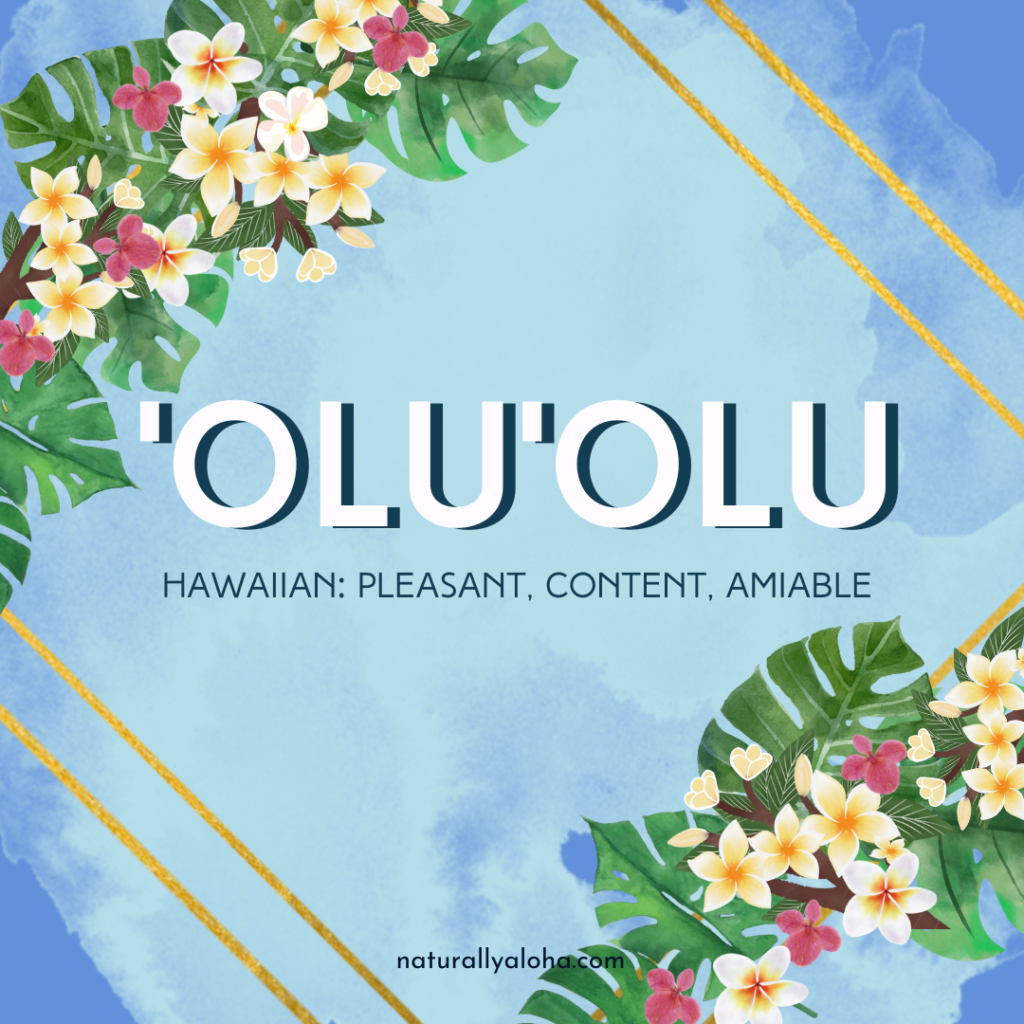
Do Good to Them That Hate You
One thing I learned from Kristie is that kindness helps everyone win. There were a few people at this event who were picky about the inn and food, but Kristie and her husband were always so professional, helpful, and—above all—kind.
It’s easy to want to defend ourselves when people blame us, get angry at us, or even hate us, but ‘olu’olu is about keeping calm, cool, and collected. It’s taking a higher road and turning the other cheek. ‘Olu’olu helps us do good to even those who hate us.
In Matthew 5:44, Jesus Christ invites us to “do good to them that hate you,” which seems backwards in our day. In our day, it’s a lot easier to backbite, gossip, and rant about things both in private and public, without regards to how the words or actions may hurt someone else.
But with ‘olu’olu, we refrain from participating in activities or things that degrade, harm, bully, or belittle others. Instead, we have compassion on others and turn the cheek to even those who hate us. This doesn’t mean we have to be best friends with those who are toxic, but we can still show kindness and courtesy.
Always Have Compassion
‘Olu’olu is much like manawale’a in that we should always give people the benefit of the doubt. We should always assume the best, because people really are good.
And beyond that, we should extend compassion.
When choosing a word for the year, my husband and I came up with “passion.” We wanted to have passion and drive for the work we’re doing. But as we’ve studied the word, we’ve found even more meaning.
“Compassion” means “with passion.” ‘Olu’olu invites us to always have compassion, which means to do things with passion. Two parables from the Bible can illustrate what compassion really looks like:
The Good Samaritan
Luke 10 tells the story of the Good Samaritan. This is a well known story where a man was traveling and was beaten and left for dead by thieves. A priest and other high ranking religious officials passed by the man. But the Samaritan, a man who was despised and discriminated against at the time, stopped to help.
Not only did the Samaritan tend to the man and his injuries, but he brought the man to an inn and paid enough for the man to stay there until he was well. Then he continued on his way, and the man who was injured probably never met the good Samaritan.
There are many people in our day and age who need help, who need compassion. Sometimes we might judge others and think, “Well, they brought this fate on his or her self.”
Maybe someone did make a choice that had negative consequences, but it’s not our place to judge. It’s our job to extend grace and compassion.
How often have we made a mistake and hoped that people would forgive us? That people wouldn’t judge but, instead, just love?
While it’s easy to think that others are the man who fell by the wayside, that man is all of us at some point or another.
If we want to be ‘olu’olu, we should seek to help and love, instead of ignore and judge.
The Prodigal Son
Luke 15 shares another well known parable of a father who had two sons. One asked for his inheritance then went and spent it on worldly pleasures. When that son was at his lowest point, he returned to his father’s house. The scriptures say that the father ran to his son, weeping and rejoicing that he had returned.
The compassion that the father showed exemplifies how we should receive others. We don’t have to cry and make a loud fanfare when others come to us for help or to change their ways, but we should be grateful and humbled to serve.
‘Olu’olu Suffers Long
1 Cor 13:4 talks about charity, and one attribute of charity is that it suffers long. This doesn’t mean that we should stay in abusive relationships or prolong pain caused by either ourselves or others. It means to have patience.
Ho’omanawanui, or ahonui, are the Hawaiian values about patience. Ho’omanawanui is to wait or get through a long time, or a long season. Patience is enduring well, whether for a few minutes or a few years.
‘Olu’olu encourages us to be patient, and to have more ho’omanawanui and ahonui. Instead of getting irritated or impatient with others or situations, we can choose to stay calm, extend grace, and have a cheerful attitude and countenance. Doesn’t that sound more refreshing than getting worked up?
Learn more about the other Hawaiian values in my book, Aloha State of Mind.
‘Olu’olu Is An Attitude
When I think of ‘olu’olu, I think of the book called “You are Special,” where little dolls put stars or black dots on each other to reward or disdain each other. At some point in the book, the main character meets a doll who has no stars or black dots.
The reason is that nothing the others said or tried to do to her stuck, because she knew who she was, and that was enough.
We are like sponges, soaking in the judgments, praises, criticism, and comments from others. For many of us, hurtful words are so detrimental. But if we know who we are—who we truly are—what difference could it make for us? It could make a huge difference.
We wouldn’t let others negatively affect us, and we would treat others with kindness because we know who they really are too. As children of God, brothers and sisters, we can adopt and attitude of ‘olu’olu and be the kind of person that helps others see who they really are. We can help others focus on what matters most, and gain clarity and optimism.
Like the other Hawaiian values discussed on this blog, ‘olu’olu is an attitude. It’s choosing to see things with a bigger perspective and knowing that what we say, do, and how we act really makes a difference.
In Conclusion
I’m so grateful for the example of Kristie. She truly showed me the kind of person I want to be: pleasant, friendly, content. There is so much in this world to complain about, to view or be negative about, but with ‘olu’olu we can change that.
We can show a light to others, either about themselves or about the situation. We can help everyone feel welcomed and loved. Let’s be as refreshing as the perfect kind of weather.
I hope this article inspired you to be a little more ‘olu’olu in your life and interactions. As you take steps to have more compassion and be a little kinder, you will continue to share aloha with the world. Mahalo!
With aloha,
Leialoha
What are your thoughts?
Did you like this article? Is there someone in your life who is ‘olu’olu? What set them apart from others? Let us know in the comments, I always love hearing from you! Mahalo!
Save this for later!
Enjoyed this article? Pin this to return to it later!



